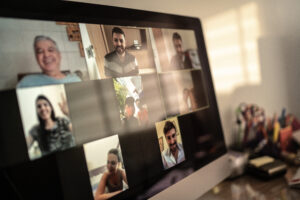
05 Jan Marketing Your Homecare Agency With Social Media
Key strategies in leveraging social media for home health care agencies – A how-to guide
For home care agencies that want to engage with potential patients, existing customers, local organizations, and partners on a more consistent and effective level, using social media can be a critically important tool. As technology keeps changing how we get and share information, it also changes how we market our home health businesses.
In this blog, we’ll cover some of the different parts of social media marketing, offering tips and best practices to help you connect with and expand your agency’s audience regardless of what level of budget you are operating with. Like any solid plan, there are actionable steps to implementing an efficient and effective social media presence across different websites.
1. Identify Target Audience and Platforms
Facebook, Instagram, Linkedin or all three?
The top social media sites are vital platforms for talking and interacting with customers because they let businesses connect better in the digital world. Now is the time to update your profile and business pages on these platforms, but especially Facebook and LinkedIn. If you don’t have a profile, please be sure to start one. Most agencies have found success setting up a separate business page and a personal “professionally themed” page (in Facebook and Linkedin you can manage your business or showcase page within the same login). Ensure that your page contains all the relevant facts about your business, where you operate, what types of services you provide, your location etc. Logos, pictures of your staff and agency, all those little things that give your business the personal and social touch will help in your interactions and your brand awareness. Building followers and likes is an important step in social media marketing.
Many agencies have found that Facebook is beneficial because it has so many users. This helps in the sharing of good information to larger pools of people, and connecting, staying in touch with those you already know, as well as building new audiences and connections online. Additionally, Facebook holds a large number of specialized groups that operate on a regional basis, dedicated to and oftentimes run by real home health professionals who use the groups to share knowledge, advertise services, and post helpful information. Conversations that take place in these groups can range from agencies looking to get the word out about a specific type of care or caregiver recruitment, to discussing information on new regulatory issues, to seeking advice on what type of home health software is most effective. There are groups dedicated to agency owners, nurses, home health aides, and even the process of starting a home care agency. Joining a national or specialty group can help from an informational standpoint while joining a regional group dedicated to homecare in your state affords you opportunities to further your brand awareness, possibly recruit caregivers and connect with families seeking care for their loved ones, and for getting a better gauge of the local home health landscape.
Examples of some of these groups within the Facebook platform are listed below, but make some time to search within Facebook for home health groups located in your specific state, city or county, or area of interest:
- Ohio Nurses Network (view)
- Homecare providers of Virginia (view)
- South Florida Healthcare Professionals (view)
- Georgia Homecare Startups (view)
- Home Health Houston (view)
- California Homecare Agency owners (view)
- Nurses of Pennsylvania discussion group (view)
- Nurses of Texas (view)
- Home health care agency professionals network (view)
- Homecare business advisors (view)
Instagram & LinkedIn
On the other hand, Instagram, which focuses on photos and short videos, is an excellent place for agencies to show off kindness, compassion, and commitment to patient care paired with expertise using pictures or small video clips. At the same time, LinkedIn, which is seen as a workplace tool, can help with making professional and industry connections, showing that your home care business knows what it’s doing.
LinkedIn and Instagram are also excellent places to establish credibility, as you can post quick videos with tips for caregivers, write short blogs, or share links to regulatory and national homecare sources. Should you desire to spend money on advertising, you can focus and promote posts that can generate business and show them to hand-picked demographics in the state or area where your agency operates, setting whatever budget and time frame you desire. Other platforms like Blogspot, which is run by Google, can be another helpful Hub where you can write a quick blog and develop a following of readers that could prove helpful in getting your agency’s name out there, and establishing you or someone on your staff as a subject matter expert.
2. Promote Specialized Services and Expertise
It’s all about content, so once you’ve created some, getting it out there in an engaging way is the next solid move to make. Showing the exact services you provide helps home healthcare organizations clearly explain their value. Whether you provide exceptional care for long-term health issues, help after surgery, or gentle end-of-life care, getting the word out about any specialized services your agency handles is a great recipe for audience expansion and business growth.
Also, stressing the education and abilities of your highly qualified staff increases trust in how knowledgeable your agency is. Home health agencies can secure new clients by showing their nursing team’s skills, work history, and caring actions.
To effectively make the most of it, organizations should create content that is more than just advertising. Whether small mom-and-pop agencies or large franchises, top-performing agencies have reported finding success in expanding brand notoriety by infusing educational facts into their messages, posts, and content. An example would be blogs and videos that highlight a particular health problem, and showcase statistics and success stories, exhibiting methods of dealing with those particular health problems. This makes the agency not only a service provider but also an expert source of valuable information, which naturally draws attention, which can lead to shares, likes, follows, reposts, and opportunities to further the message and your agency’s credibility as a resource.
3. Utilize Engaging Multimedia Content
“According to recent marketing research statistics, viewers remember 95% of a message when delivered by video, but only 10% via written text.”

A good, solid social media, or rather MULTIMEDIA plan uses effective pictures and videos to engage with the audience. This helps them learn about who you are and what’s being marketed in an exciting way, bolstering your agency’s appeal to all kinds of segments within the groups of potential patients and partners you are likely aiming for.
Videos, even if made and edited on your phone versus produced with video editing software, are a great way to show information in an engaging way. Many agencies find that videos best show the daily work of home healthcare caregivers, directors of nursing, and administrators, demonstrating clear instructions on dealing with certain conditions during visits in the home. This can showcase how necessary these services are to keep people healthy and happy, while providing seasoned expertise from your staff. But, keep in mind, that the information should be both interesting and informative. Short videos that are less than two minutes will have higher click-through and engagement, but experimentation with lengthier videos on more complex topics should not be ruled out as you grow your audience. With today’s technology improvements, you can practically film and edit a full-length movie on an iPhone, so the barriers of entry are lower, making the creation of quality content far easier to grasp and deliver.
If you’re handy with a computer, infographics are another great tool for turning hard-to-understand information into easy-to-understand pieces. Home care companies can use pictures to show facts, give quick tips, or help visually explain the advantages of their unique services. This way of making content works well in places like Instagram and Facebook.
Lastly, LIVE sessions have become an essential way to talk directly and quickly with the audience. Whether you’re having online chats with doctors or community partners, showing tips on patient care techniques, or talking about important health issues on the spot, going live increases the opportunity for immediate engagement and makes everything feel real and important. Grant some time and attention to ensuring your content is aligned and planned out to make sure the content you deliver lines up with what the audience is looking for, so it speaks directly to those who are watching. The major advantage here is that social media allows you to go live on platforms like Facebook, Instagram, and more WITHOUT incurring monetary costs. You can use your social media pages to promote specialty sessions you have reviewing tips and techniques hosted by your nurses, lead discussions on pertinent topics, and further establish your agency as an important voice in the local home health care community. A large part of effective marketing is trust, and the more trust you can build through establishing your agency and your staff as experienced professionals, the easier it is to build your business.
4. Create a Consistent Posting Schedule
For home health agencies, having a solid online presence of consistent content can be the missing piece in your marketing. Creating a regular posting plan is the main way to start (and there are free or low-cost programs that can help with this that are a mere Google search away). That said, achieving this consistency needs careful thinking and adjusting because it does require someone’s time. Agencies should look into platform analysis to see the best posting times that match when their targeted audience is most active. While this may require a little research as well as some trial and error, once you establish a cadence you’ll gain momentum and audience growth for your content posting.
To carry out this plan well, many successful agencies have taken to utilizing timetable tools, as these tools can do more than just arrange things in order; they can help make posting content automatic, giving more time to create interesting stories that connect with their audience. This intelligent use of automation gives constant content without having to post by hand all the time.
5. Encourage Audience Interaction
 One overlooked key strategy is going after strong audience interaction on social media sites by aligning your content development and delivery with current trends and pain points. This helps to create important bonds with your target audience and the community. Making this connection is more than just putting out content, as home health agencies should encourage and inspire people to interact with their posts by liking, commenting, and sharing. Some agencies have even gone to the extent of offering little incentives like a free dinner, coupon or discount, or something pleasant to get their posts engagement up. Even with small incentives like rewards for resharing, tagging friends, re-posting, liking etc, can pay off in the long game of growing and consistently expanding your audience and agency brand awareness.
One overlooked key strategy is going after strong audience interaction on social media sites by aligning your content development and delivery with current trends and pain points. This helps to create important bonds with your target audience and the community. Making this connection is more than just putting out content, as home health agencies should encourage and inspire people to interact with their posts by liking, commenting, and sharing. Some agencies have even gone to the extent of offering little incentives like a free dinner, coupon or discount, or something pleasant to get their posts engagement up. Even with small incentives like rewards for resharing, tagging friends, re-posting, liking etc, can pay off in the long game of growing and consistently expanding your audience and agency brand awareness.
It’s additionally important to remember that with more engagement, comes the responsibility to re-engage! It is very important for home health agencies to not just watch but also quickly respond to questions and thoughts from their audience. A quick and personal reply shows that you are paying attention, and encourages more participation and relationship-building. Answering comments also gives a chance to teach the audience more, alleviate some worries, and make your online presence seem like a real person or trusted friend, more so than just an agency or business. This back-and-forth talk helps create a strong bond. It changes social media from just sending messages to becoming a place where people feel listened to and important.
6. Monitor Analytics and Adjust Strategies
Checking social media numbers regularly is not just a basic job; it’s an essential part of using data to make decisions. Views and interactions, who the audience is, and where the content reaches are the building blocks for achieving the ROI on your time, energy, and sometimes money spent on social media. Though this might mean looking at many different places and tools, the information you gather can solidify your strategy for making content better and figuring out what it takes to define and measure success. As social media becomes more prevalent, related technologies like automated posting programs, SEO analysis tools, digital scheduling platforms, and even homecare software will likely offer integrations for social media and marketing initiatives.
Changing marketing plans according to how they’re working is what comes from knowing a lot about social media. It’s the best way to make good decisions in online advertising. Testing and improving messaging, taking notice of what’s popular, and adjusting content types and strategy, all are important things to consider as you grow your online presence using social media. Who to target, when to share, and what to create and share (all driven by the data) will make adjusting your overall performance-based strategy second nature in aligning your content and messaging with your audience’s changing needs and wants.
The Takeaway
In conclusion, mastering social media for home healthcare marketing requires a thoughtful blend of platform diversity, engaging content creation, consistent presence, interactive strategies, and data-driven decision-making. By adhering to these principles, home care agencies can navigate the dynamic digital landscape, establishing themselves as trusted subject matter experts, growing customers and referrals, and fostering lasting connections.
Related Topics
Explore more thrive blogs to grow and market your agency:
SEO tips for home health agencies
 Alora home health software is designed to help agencies function at a high level of efficiency, while delivering an optimal level of patient care. With a simple user interface at its core, Alora was voted easiest to use home health software in Software Advice’s Reviewer’s Choice awards. For administrators and caregivers, Alora brings the power of simple to every aspect of a home health business
Alora home health software is designed to help agencies function at a high level of efficiency, while delivering an optimal level of patient care. With a simple user interface at its core, Alora was voted easiest to use home health software in Software Advice’s Reviewer’s Choice awards. For administrators and caregivers, Alora brings the power of simple to every aspect of a home health business
Want to learn more about how Alora can help your home health agency?

No Comments